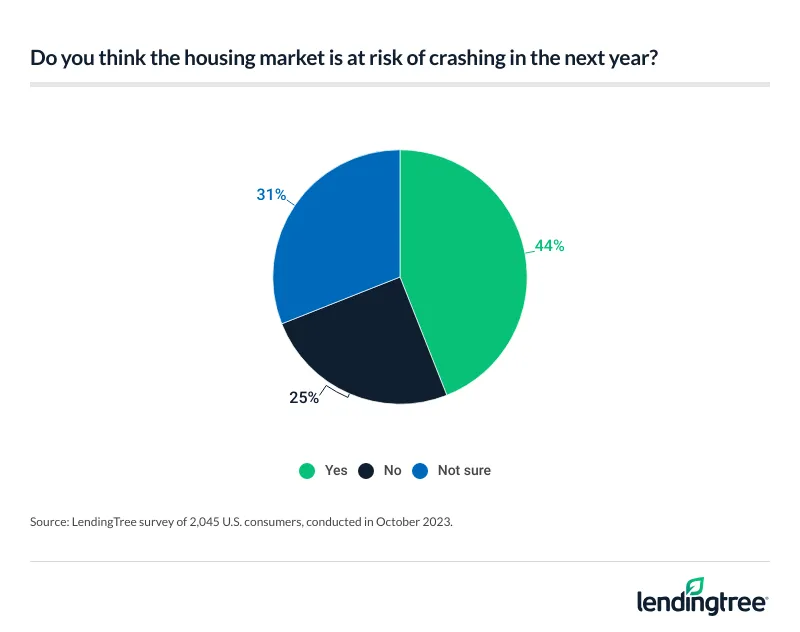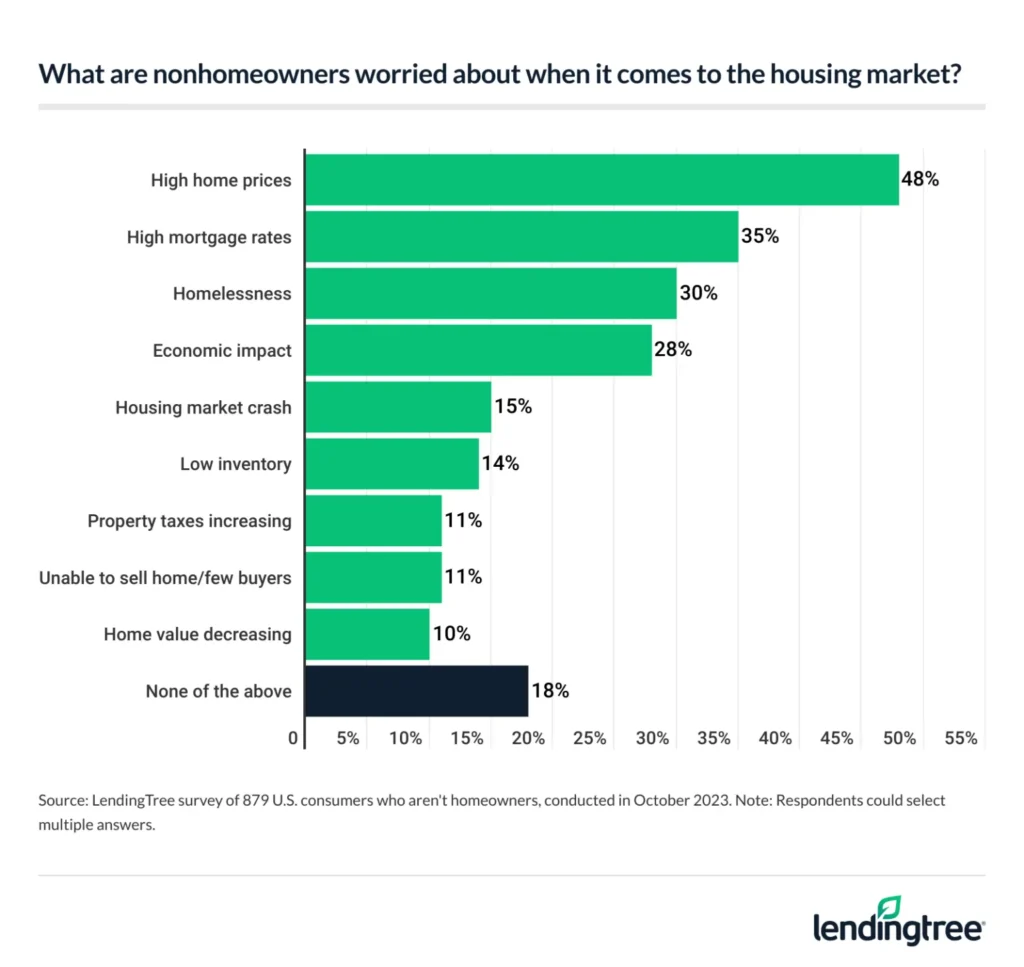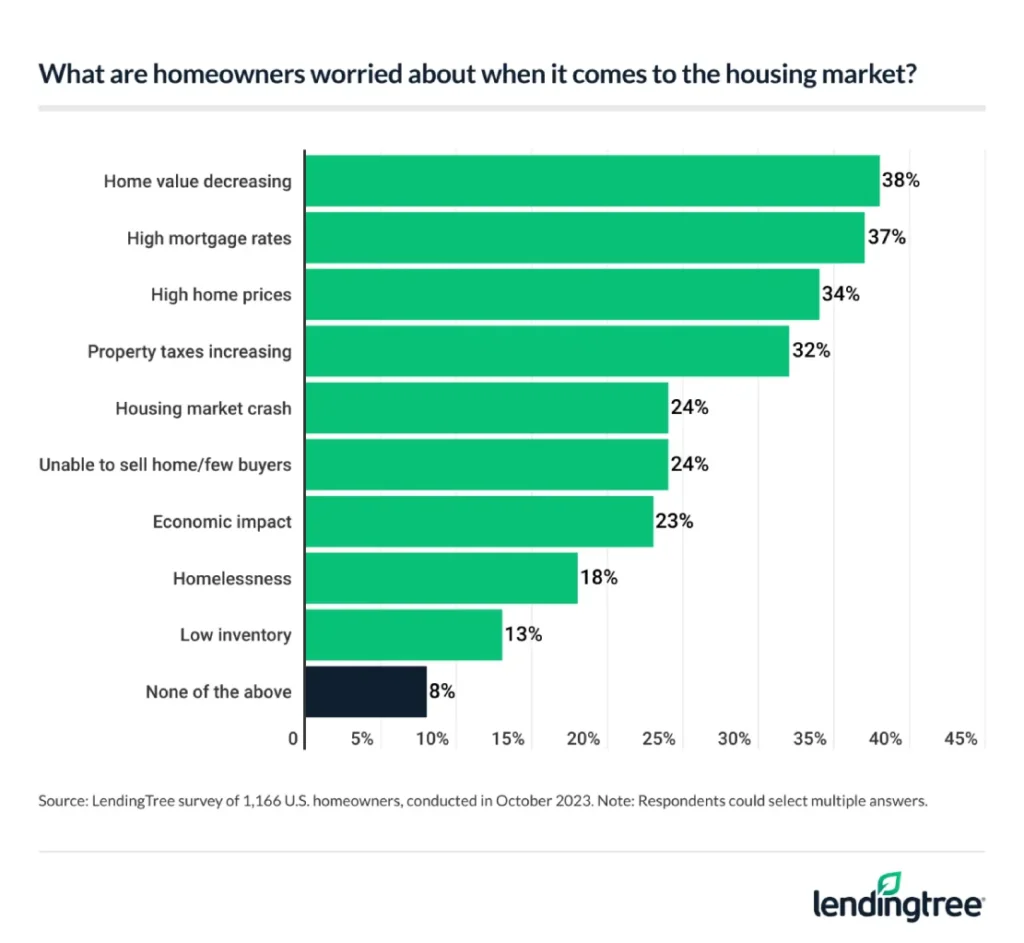44% of Americans Think Housing Market at Risk of Crashing in Next Year — and 35% Hope It Does
It’s impossible to predict the housing market’s future — but most Americans have a pretty grim outlook.
According to the latest LendingTree survey of over 2,000 U.S. consumers, 44% of Americans think the housing market is at risk of crashing in the next year. And with some nonhomeowners believing a crash is the only way they could afford a home, it may not seem surprising that 35% of Americans want the market to crash.
Here’s what else we found.
Key findings
- Most Americans aren’t optimistic about the housing market, with some hoping for a downturn. 44% of Americans think the housing market is at risk of crashing in the next year, with another 31% unsure. What’s more alarming is that 36% of homeowners and 35% of Americans overall want the market to crash. And while 51% of homeowners don’t want the market to burst, 15% of them say they want a crash to lower their property taxes and 15% believe it would lead to future stability.
- Nearly a third of nonhomeowners think a crash is their only way to own a home. 32% of nonhomeowners believe this, but that rises to 39% among Gen Zers and 38% among millennials who don’t own. Mortgage interest rates aren’t helping: Across all Americans, 53% are worried they’ll remain high. Separately, 79% expect rates to rise for at least another year. Looking ahead, 27% believe mortgage rates will be 8.00% or higher one year from now.
- Those who have a locked-in low rate may be stuck in their homes. Half (50%) of homeowners say their current rate is keeping them in their houses. In addition, three-fourths (75%) of Americans are unsure if they’ll ever see rates as low as in 2020 and 2021, and 11% of homeowners don’t think they’ll ever be able to buy a home again.
- Whether you rent or own, home prices and values are top of mind — for opposite reasons. When asked about their biggest housing market worries, nonhomeowners cite high home prices (48%), while homeowners cite decreasing home values (38%). All in all, though, 62% of Americans think home prices will increase in the next year, with two-thirds (66%) of them believing they’ll rise by 5% or more.
Americans believe a housing crash is coming — and some look forward to it
It’s been a difficult year for consumers looking to buy a home, with 30-year mortgage rates reaching nearly 8.00% in October 2023 — the highest since November 2000. Those figures are certainly weighing heavily on most Americans: In fact, 44% think the housing market is at risk of crashing in the next year, while another 31% are unsure.

Millennials (ages 27 to 42) are the most likely age group to believe a market crash is coming, at 52%. That’s followed by:
- Gen Zers (ages 18 to 26) (48%)
- Gen Xers (ages 43 to 58) (42%)
- Baby boomers (ages 59 to 77) (30%)
In addition, those with children younger than 18 (55%) are more likely to expect a market crash than those without children (39%) and those with children older than 18 (35%). Meanwhile, homeowners (46%) are slightly more likely to think a market crash is coming than nonhomeowners (41%).
But not everyone thinks a market crash would be bad, though: 36% of homeowners want the market to crash. Among this group, 15% of them say they want a crash to lower their property taxes and 15% believe it would lead to future stability.
More broadly speaking, 35% of Americans want the market to crash. That’s especially true among Gen Zers (53%), millennials (46%) and those with children younger than 18 (46%). On the other hand, baby boomers (18%) and those with children older than 18 (22%) are the least likely to share this feeling.
LendingTree senior economist Jacob Channel isn’t surprised that so many people want the market to crash, but he’s skeptical about whether they know what it would mean.
“Right now, home prices are high, as are mortgage rates,” he says. “With that in mind, I can understand why some might wish for a housing crash that brings lower prices. Unfortunately, if the national housing market were to crash, odds are that it would bring down the rest of the economy with it.”
This happened in 2008 when the housing market crashed and contributed to the largest global recession since World War II. While houses got less expensive, lending standards tightened and millions of people lost their jobs. Because of this, Channel says, it became harder for most people to buy — not easier.
Still, Channel says, there’s hope for potential homebuyers.
“It’s not impossible for home prices to fall and make a given housing market more affordable,” he says. “It’s also not necessarily impossible for the housing market to outright crash next year while the rest of the economy remains relatively OK (though it’s very unlikely). But if you’re hoping that the housing market will crash and make it easier for you to buy a house, you’ll probably be disappointed. Not only does data indicate the odds of a housing crash in the next few years are slim, the past shows that when the market crashes, it tends to hurt more people than it helps.”
Some nonhomeowners believe a crash is the only way they could buy
Despite the potential consequences of a market crash, 32% of nonhomeowners believe a downturn is the only way they could afford a home. That’s particularly true among young Americans — 39% of Gen Zers and 38% of millennials who don’t own. Across all demographics, those earning $50,000 to $79,999 (41%) and those with children younger than 18 (39%) are also among the most likely to share this sentiment.
Mortgage interest rates likely play a large role, though nonhomeowners aren’t the only ones worried. The average rate for a 30-year fixed mortgage was 7.50% as of the week of Nov. 9, and 53% of Americans are worried rates will remain high.
That’s particularly true among those with children younger than 18 (61%), those earning $75,000 to $99,999 (60%) and millennials (59%). In addition, women (56%) are more worried about high interest rates than men (49%).
Separately, 79% expect rates to rise for at least another year, with 53% of this group believing rates will rise for over a year or longer. Regardless of how long they expect rates to rise, though, 27% of Americans believe mortgage rates will be 8.00% or higher a year from now. Beyond that:
- 19% believe mortgage rates will be between 5.00% and 5.99%
- 15% believe mortgage rates will be between 6.00% and 6.99%
- 13% believe mortgage rates will be between 7.00% and 7.99%
Gen Zers are the most optimistic age group, with 21% thinking rates will be between 5.00% and 5.99%. Meanwhile, 21% of baby boomers think rates will be between 7.00% and 7.99%.
While it’s difficult to predict what mortgage rates will look like in the future, Channel says there’s reason to believe rates will go down next year.
“Across the board, interest rates have risen dramatically since the start of 2022, and mortgage rates are no exception,” he says. “Fortunately, just because rates have risen over the last two years doesn’t mean they’ll continue to climb in 2024. On the contrary, there are encouraging signs, like cooling inflation, that could help bring down rates next year. If inflation continues to cool and the Fed starts cutting rates in 2024 (as they appear poised to do), rates should fall. They won’t plummet, but they might end up closer to 6.00% or 7.00% than 8.00% or higher.”
However, there’s no guarantee. For example, if inflation starts to get noticeably worse again or if bond yields remain elevated, mortgage rates could stay high for some time.
“Ultimately, mortgage rates are constantly fluctuating, and it can be hard to gauge where they’ll end up a week from now, let alone a year into the future,” Channel says. “That said, there’s no reason to assume rates will stay high forever, and there are signs that suggest that they’ll start to come down (albeit slowly) over the next year.”
Homeowners with low mortgage rates may feel stuck
It’s not just nonhomeowners struggling with rising rates — homeowners believe they have implications for them, too. Among this group, 50% say their current rate is keeping them in their houses and they don’t want to get financing on a new house. That’s especially true for homeowners with kids younger than 18 and millennial homeowners, at 64% and 61%, respectively.
Overall, Americans believe 2020 and 2021 was a once-in-a-lifetime opportunity for homebuying, when mortgage rates were between 2.65% and 3.72%. Three-fourths (75%) of Americans say they aren’t sure if they’ll ever see rates as low as in 2020 and 2021 — a figure that rises to 82% among those earning $50,000 to $74,999, 81% among women and nonhomeowners, and 78% among baby boomers and those without children.
With these beliefs in mind, 11% of homeowners don’t think they’ll ever be able to buy a home again and 19% are unsure.

Although it’s difficult to say what the future holds, Channel says consumers are right to believe seeing low rates again is unlikely.
“There’s a chance that they could fall back to their 2020 and 2021 levels again at some point, just as there’s a chance they’ll spike back up to their early 1980s levels,” he says. “From where things stand, I’d say that either scenario is more unlikely than not.”
While Channel believes rates will come down over the next few years, he says he’d be genuinely shocked if they fall to their height-of-the-pandemic record lows: “Unless something catastrophic — like another major pandemic or a meteor crashing into Manhattan — I think people are right to assume rates aren’t going to fall to sub-3.00% levels anytime soon, if ever.”
Concerns about home prices and values plague homeowners and nonhomeowners alike
Regardless of homeownership, home prices and values are top concerns for Americans — though nonhomeowners have different reasons for concern than homeowners. Among nonhomeowners, the top housing market concern is high home prices (48%). That’s followed by high mortgage rates (35%) and homelessness (30%).

Meanwhile, homeowners say their top worry is decreasing home values (38%). Still, like nonhomeowners, homeowners are also concerned about high mortgage rates (37%) and high home prices (34%).

This comes as 62% of Americans think home prices will increase in the next year. Of this group, 66% think they’ll rise by 5% or more, with 48% believing home prices will rise between 5% and 9.99%.
Looking ahead: Expert tips to prepare for any market changes
Regardless of whether you’re buying or selling next year (or preparing for the years ahead), managing market expectations can be difficult. To ensure you’re prepared for any market fluctuations, Channel offers the following advice:
- Don’t count on a crash to save you from high prices. “Today’s housing market is far from perfect,” he says. “It’s prohibitively expensive for many and often tough to navigate. That said, there isn’t much reason to think the housing market will outright crash next year. Prices will probably come down in some parts of the country (even if they continue to climb nationwide) and rates might also decline, but affordability challenges are unlikely to suddenly disappear. Because of this, if you want to buy, you should do things like save and work on strengthening your finances instead of hoping for a crash.”
- Plan, but don’t forget about the present. “Often, the more time you give yourself to do things like save money, increase your credit score and pay down other debts, the easier getting approved for a mortgage and buying a house can be,” he says. “That said, you don’t want to focus too much on what might happen that you forget about what’s going on. An ‘ideal’ time to buy a house may never come, and if you’re in a good position to buy now, doing so might be a good idea. After all, you could miss plenty of great opportunities if you’re too worried about the future to act in the present.”
- Keep informed. “The housing market is constantly changing and what’s going on can vary significantly from place to place,” he says. “Because of this, you’ll want to try to stay on top of what’s going on, especially if you’re looking to buy or sell a house. You don’t need to obsessively keep track of mortgage rates or home prices in your area, but having a general idea of where things stand is typically good. Remember that just because the housing market looks a certain way today doesn’t mean it’ll look the same tomorrow.”
Methodology
LendingTree commissioned QuestionPro to conduct an online survey of 2,045 U.S. consumers ages 18 to 77 from Oct. 12 to 15, 2023. The survey was administered using a nonprobability-based sample, and quotas were used to ensure the sample base represented the overall population. Researchers reviewed all responses for quality control.
We defined generations as the following ages in 2023:
- Generation Z: 18 to 26
- Millennial: 27 to 42
- Generation X: 43 to 58
- Baby boomer: 59 to 77
View mortgage loan offers from up to 5 lenders in minutes

